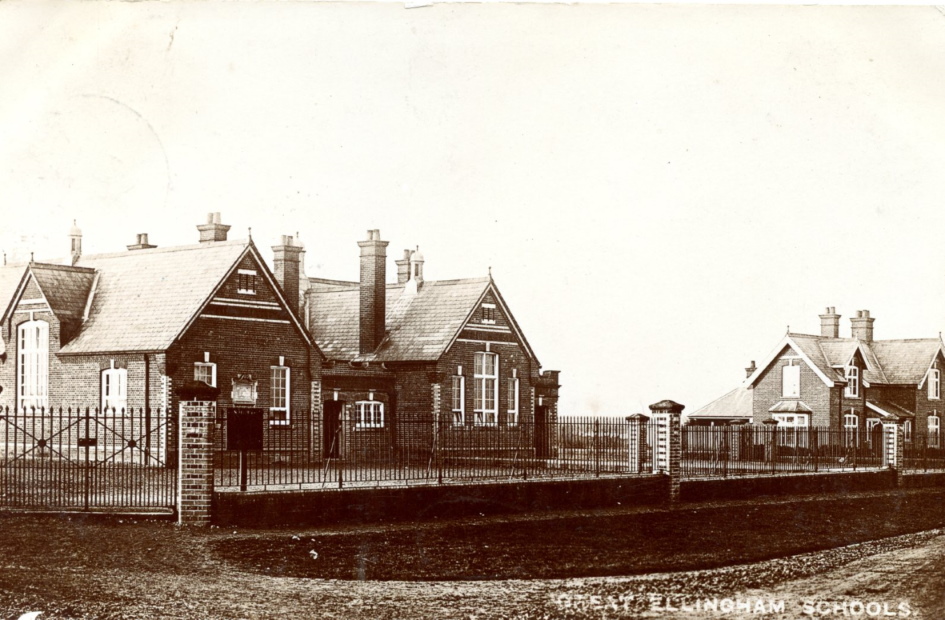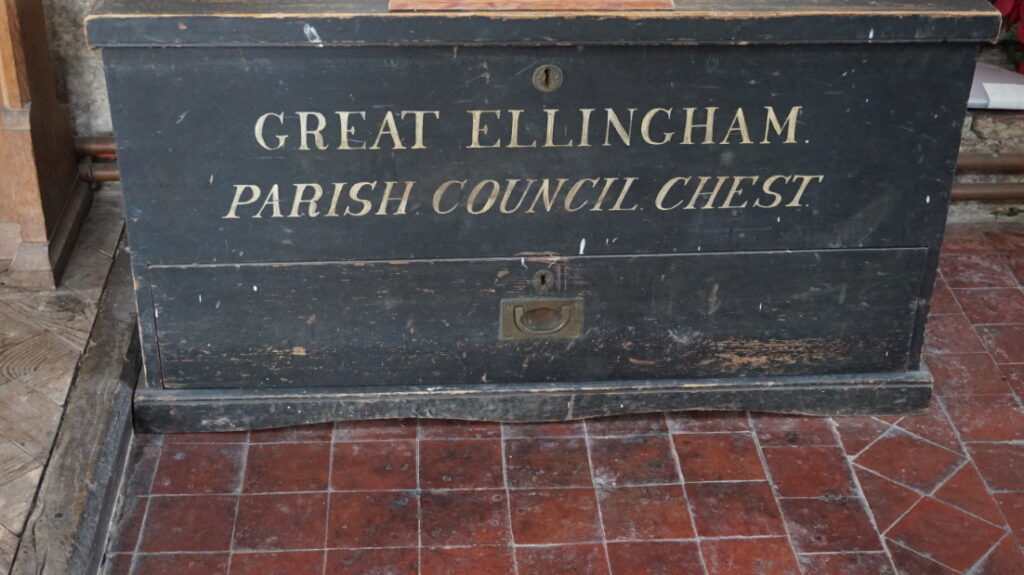Parish Administration Prior to 1894
Prior to the establishment of Parish Councils, the responsibility for the day to day administration of the parish fell to the rector and some of the more affluent landowners – particularly those who could read, write and keep accounts.
In Great Ellingham, the parish ‘officers’ such as the churchwardens, the overseers, surveyors and constables, were nominated at meetings held in the vestry of St James.
Details of these meetings and the nominations were entered in the ‘Town Book’, which also contained the accounts for the parish.
This book (together with the Parish Registers and other important parish documents) were kept in the parish chest.

Parish Chest in Great Ellingham Church – with three locks!
The Poor Law legislation of 1552 required every parish to have a strong chest with three keys, in which to keep alms for the poor. Earlier separate legislation required parishes to safely keep parish registers and other important parish documents in a lockable chest.
The wonderful old chest [pictured above] in St James has three locks! This chest would, of course, been used to keep the alms for distribution among the poor of Great Ellingham, and also to store the Parish Registers, Town Book etc.
Elected Parish Councils
Amongst other reforms, the Local Government Act of 1894 allowed the establishment of elected parish councils in rural areas. In addition, property owning women were able to vote in local elections, become poor law guardians, and act on school boards.
The Act also provided that parish council could hold their meetings free of charge in a room in a state-supported public elementary school.
First Meeting and the Election of Great Ellingham Parish Council

Great Ellingham Board Schools before 1905
What may have been the first meeting of the Great Ellingham Parish Council was held in the Board School on December 4th, 1894 – presumably free of charge in accordance with the Act!
Schoolmaster John A Field took the chair.
The main business was the nomination and election of the members of the Parish Council. Valid nominations were received by the chairman in relation to the following men:
| Mr A W Clarke (who was nominated twice) |
| Mr George C Hunter |
| Mr William Kerrison |
| Mr James Knights |
| Mr Robert B Lebbell |
| Mr Robert Pease |
| Mr Ernest E Rushbrooke |
| Mr Albert Spurgeon |
| Rev. James Toll |
An opportunity was given for questions to be put to each of the candidates.
William West asked Alfred Clarke (and every other candidate in turn), ‘if they were willing to do away with officialism in the management of the charity’. All the candidates confirmed they were.
Reverend James Toll said he would do his best for the labourers in obtaining allotments. He also stated that he was in favour of providing a Public Library for the Parish.
Following a vote by the showing of hands, the following candidates were elected:
| Names | Votes |
| Albert Spurgeon | 52 |
| Rev. James Toll | 49 |
| James Ducker | 45 |
| William Kerrison | 44 |
| George C Hunter | 41 |
| James Knights | 39 |
| Ernest E Rushbrooke | 38 |
Alfred W Clarke, Robert B Lebbell and Robert Pease with 29, 25 and 24 votes respectively, were not elected.
With no demand for a poll coming from any Parochial Elector, the election of the seven members was declared. Accordingly, they became the very first members of Great Ellingham Parish Council.
Following votes of thanks to the chairman Mr J A Field, and to Mr George Barlow for taking the minutes of the meeting, the first proceedings of the Great Ellingham Parish Council came to an end.

Great Ellingham Parish Council Chest in St James’s Church
Sources:
December 1894-January 1941. Great Ellingham. Parish Council Minutes. Norfolk Record Office. Cat. Ref: PC116/10
Few, Janet. 2014. The Family Historian’s Enquire Within. Sixth Edition. The Family History Partnership, 57 Bury New Road, Ramsbotton, Bury, Lancs. BL0 0BZ. Pages 206 & 207